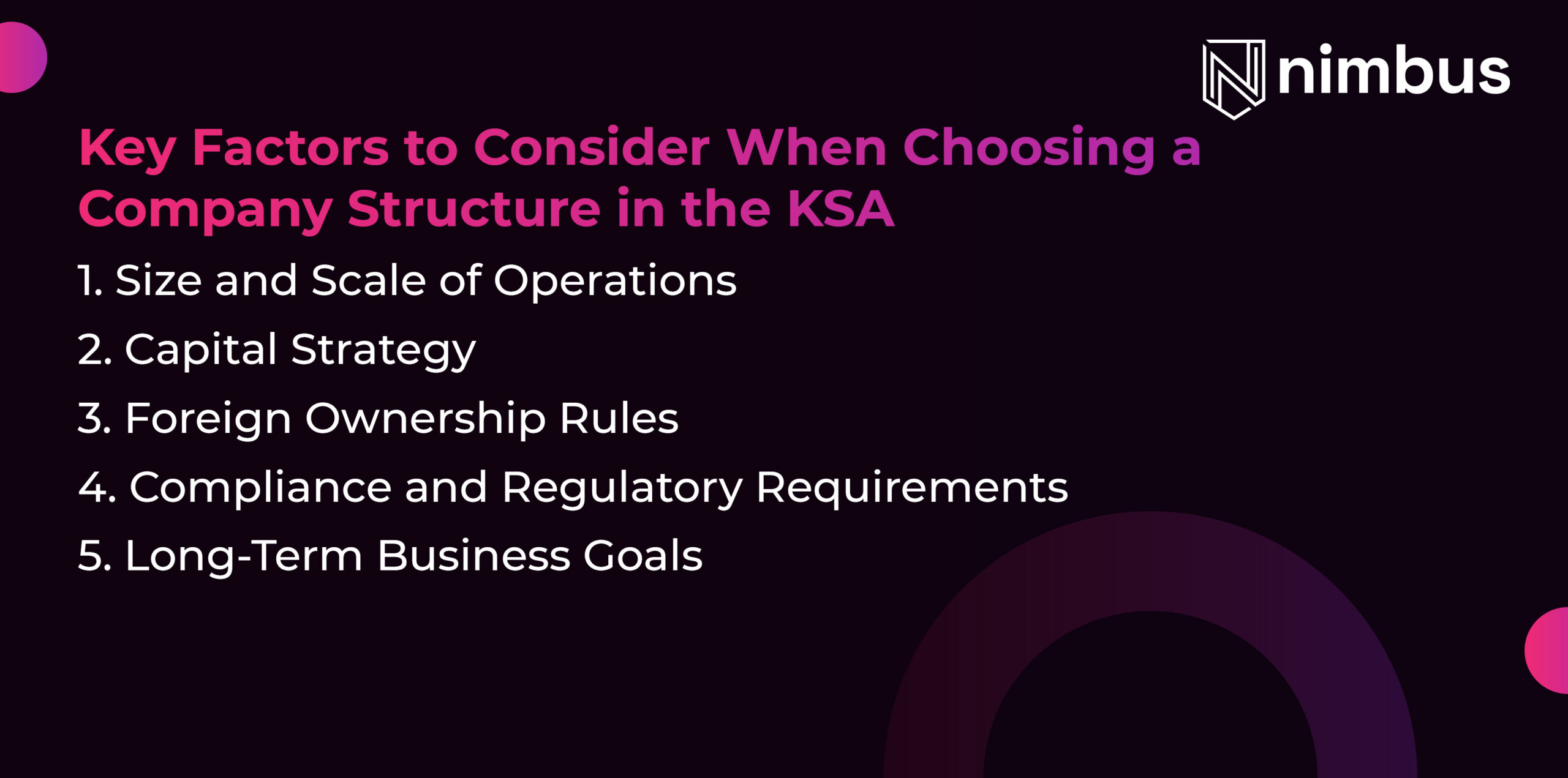Entering the Saudi Arabian market for foreign parent company requires more than just strategic foresight and industry knowledge. One of the most crucial early decisions you will make is selecting the right legal structure for your parent company.
This foundational step in the business setup in the KSA will shape your compliance obligations and impact your company’s liability, capital strategy, and long-term growth potential.
For foreign investors and companies planning for Saudi expansion, this post acts as a guide to the most suitable legal structures – Limited Liability Companies (LLCs), Joint-Stock Companies (JSCs), and Simplified Joint-Stock Companies (SJSCs), and highlights the critical factors that should influence your choice.
Understanding Legal Structures for Parent Entities in Saudi Arabia
The legal framework in Saudi Arabia is influenced by both Sharia law and civil law principles. Regulated by entities such as the Ministry of Investment (MISA) and the Ministry of Commerce, the Kingdom offers several corporate structures for business incorporation in the KSA.
Among these, LLCs, JSCs, and SJSCs are the most relevant for foreign parent entities or holding companies. Each structure comes with its unique set of legal, financial, and operational characteristics, making it essential to match the structure to your organizational goals, operational scale, and investment strategy.
1. Limited Liability Companies (LLCs)
LLCs are the most commonly used structure for foreign investors looking at private business setup in the KSA. They offer a relatively straightforward path to incorporation and flexibility in governance.
- Allow 1 to 50 partners.
- No requirement for public listing.
- Can be fully foreign-owned.
- Managed by a single manager or a board of managers.
- Liability is limited to each partner’s share in the capital.
LLCs are well-suited for small to mid-sized companies that plan to keep operations private. For foreign-owned parent companies, this is often the most cost-effective and administratively efficient option.
2. Joint-Stock Companies (JSCs)
JSCs are equivalent to public or closed corporations in other jurisdictions and are generally used for large-scale, capital-intensive operations. This structure is ideal for large conglomerates or parent entities that aim to scale rapidly, access public capital markets, or diversify shareholder participation.
- Require at least two shareholders (a single shareholder is permitted in specific cases involving government-related entities with capital exceeding SAR 5 million).
- Can be listed on the Saudi Stock Exchange (Tadawul).
- Must be governed by a board of directors comprising 3 to 11 members.
- Suitable for capital raising and investor-backed ventures.
3. Simplified Joint-Stock Companies (SJSCs)
SJSCs are a relatively new and flexible structure introduced under recent legal reforms in Saudi Arabia. They combine the agility of an LLC with some of the growth-friendly features of a JSC.
This structure is suitable for fast-growing businesses or family offices planning to expand in the Kingdom without the complexity of JSC compliance.
- No minimum capital requirement.
- Can issue different classes of shares including redeemable and convertible shares.
- Offer a simplified governance structure.
- Suitable for SMEs or medium-sized holding companies.
Key Factors to Consider When Choosing a Company Structure in the KSA

When planning Saudi business formation, several core considerations should guide your decision. The major ones are listed below.
1. Size and Scale of Operations
Small parent companies with a focused operational model may benefit from the flexibility of an LLC. In contrast, larger enterprises with regional or global subsidiaries and diverse operations should lean toward JSCs for their scalability and formal governance framework.
2. Capital Strategy
If your company plans to raise capital from public markets or is seeking institutional investors, a JSC is the most viable structure. On the other hand, companies that rely on private funding and internal capital will find LLCs and SJSCs more efficient.
3. Foreign Ownership Rules
LLCs in Saudi Arabia allow 100 percent foreign ownership without the burden of high initial capital. JSCs may require a more significant capital commitment and are subject to stricter ownership structures in certain sectors.
4. Compliance and Regulatory Requirements
LLCs offer a simpler compliance landscape, ideal for companies that want lean operations. JSCs, however, are subject to a more rigorous regulatory environment, including mandatory board meetings, financial reporting, and shareholder communications.
5. Long-Term Business Goals
If public listing is part of your long-term vision, starting with a JSC or SJSC can save time and structural changes later. For companies focused on private growth and minimal public disclosure, LLCs are the most straightforward option.
Align Legal Structure with Business Strategy
Choosing the correct legal structure for your parent company is one of the most critical decisions in business setup services in Saudi. It affects everything from ownership rights and liability to regulatory obligations and capital raising capabilities.
LLCs are well-suited for smaller, privately held parent entities. JSCs serve large, publicly oriented groups with ambitious growth and capital goals. SJSCs strike a balance for those aiming to scale thoughtfully without overburdening their governance systems.
However, foreign parent companies should seek professional guidance when planning business incorporation in the KSA. An experienced consultancy can help navigate licensing, capital structuring, and compliance, ensuring your Saudi business formation starts on the right foot.



